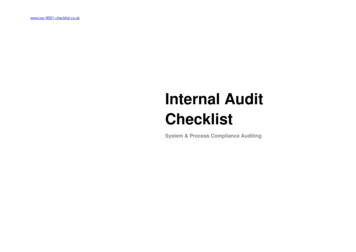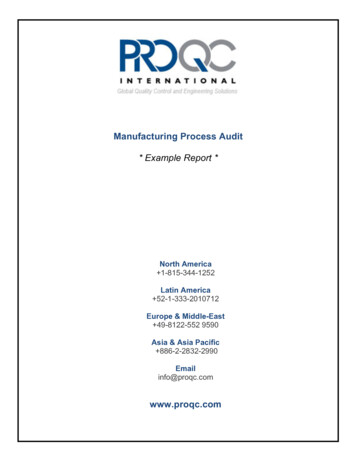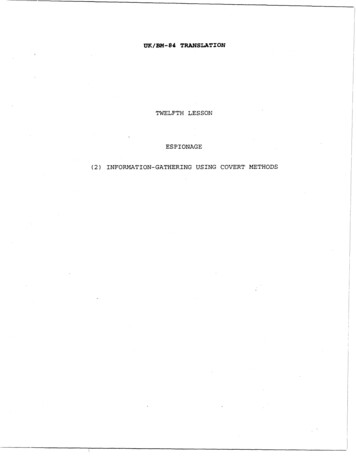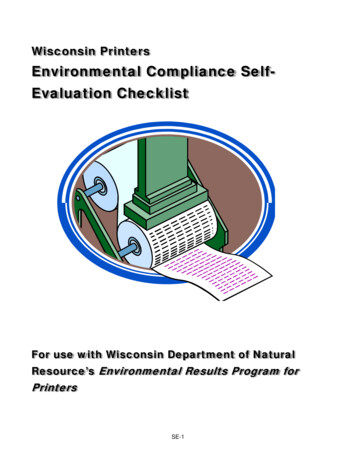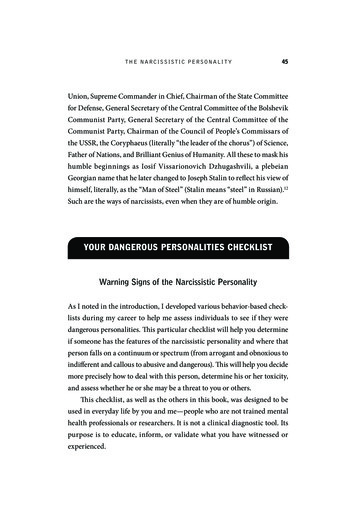
Transcription
T HE NARCI SSI STIC P ERS O NAL IT Y45Union, Supreme Commander in Chief, Chairman of the State Committeefor Defense, General Secretary of the Central Committee of the BolshevikCommunist Party, General Secretary of the Central Committee of theCommunist Party, Chairman of the Council of People’s Commissars ofthe USSR, the Coryphaeus (literally “the leader of the chorus”) of Science,Father of Nations, and Brilliant Genius of Humanity. All these to mask hishumble beginnings as Iosif Vissarionovich Dzhugashvili, a plebeianGeorgian name that he later changed to Joseph Stalin to reflect his view ofhimself, literally, as the “Man of Steel” (Stalin means “steel” in Russian).12Such are the ways of narcissists, even when they are of humble origin.YOUR DANGEROUS PERSONALITIES CHECKLISTWarning Signs of the Narcissistic PersonalityAs I noted in the introduction, I developed various behavior-based checklists during my career to help me assess individuals to see if they weredangerous personalities. This particular checklist will help you determineif someone has the features of the narcissistic personality and where thatperson falls on a continuum or spectrum (from arrogant and obnoxious toindifferent and callous to abusive and dangerous). This will help you decidemore precisely how to deal with this person, determine his or her toxicity,and assess whether he or she may be a threat to you or others.This checklist, as well as the others in this book, was designed to beused in everyday life by you and me—people who are not trained mentalhealth professionals or researchers. It is not a clinical diagnostic tool. Itspurpose is to educate, inform, or validate what you have witnessed orexperienced.017-056 152190 CH1.indd 45070320141613357/3/14 4:08 PM
46DANGEROUS PER S O N A L IT IE SRead each statement in the checklist carefully and check the statements that apply. Be honest; think about what you have heard an individual say or seen him or her do, or what others have expressed to you.Obviously, the best evidence is what you yourself have observed and howyou feel when you are around or interact with this person.Check only the statements that apply. Don’t guess or include more thanmeet the criteria exactly. If in doubt, leave it out. Some items seem repetitiveor appear to overlap—that is intentional, to capture nuances of behaviorbased on how people typically experience or describe these personalities.It is very important that you complete the entire checklist, as designed,to increase its reliability. Each complete checklist covers very subtle yet significant issues that you may never have thought about. Some items may helpyou remember events you’d forgotten. Please read each statement, even if youfeel you’ve seen enough or that the first few items don’t seem to apply.Gender pronouns (he, she, etc.) are used interchangeably in the statements. Any statement may be applicable to any gender.We’ll evaluate scores when you’re done, but for now, check off eachitem below that applies.P1. Projects self-importance beyond position, experience, orwhat has been duly earned or deserves.P2. Has a grandiose idea of who he is and what he canachieve.P3. Often talks about his need to lead, to be in charge, toexercise power, or for achieving immediate success.P4. Believes she should only associate with other “special,”“successful,” or “high-status” people.PP5. Requires excessive admiration from others.P017-056 152190 CH1.indd 466. Has a sense of entitlement, expecting to be treated assomeone special or given priority at all times.7. Is interpersonally exploitative of others and takesadvantage of others for personal gain.070320141613367/3/14 4:08 PM
T HE NARCI SSI STIC P ERS O NAL IT YP8. Lacks empathy and is unable to recognize the needs orsuffering of others.P9. Is often envious of others or believes others are enviousof him.PP10. Is arrogant and haughty in behavior or attitude.P12. Has an exaggerated sense of privilege that allows him tobend rules and break laws.P13. Is excessively self-centered to the point of alienatingothers by being so “I” or “me” oriented.P14. Is hypersensitive to how she is seen or perceivedby others.P15. Has regularly irritated or upset you, and others complainof the same.P16. Routinely spends an inordinate amount of time ongrooming, looking good, and being pampered.P17. Tends to overvalue himself and his capabilities in almostall things.P18. Has devalued others as being inferior, incapable, or notworthy.P19. Has demonstrated little sympathy or empathy for others;nevertheless, she expects others to show her empathy.P20. Has ignored the needs of others, including biological(food, water, etc.), physical (housing, clothing, etc.),emotional (love, touching, hugging, etc.), and financialneeds, on multiple occasions.PPPP21. Is not happy when others succeed or receive recognition.017-056 152190 CH1.indd 474711. Has a tendency to see her problems as unique or moreacute than anyone else’s.22. Is considered to be or acts like a bully.23. Talks at you rather than with you.24. Needs to be the center of attention and does things todistract others to ensure being noticed (e.g., arriving late,wearing eye-catching clothing, using dramatic language,or making theatrical entrances).070320141613377/3/14 4:08 PM
48DANGEROUS PER S O N A L IT IE SP25. When she communicates with you, it feels as if she issending messages but is not receiving messages.Communication is only one-way.P26. Assumes others value him as much as he does himselfand is shocked to learn that they don’t.P27. Insists on having the best of everything (house, car, electronics, jewelry, clothes), even when she can’t afford it.P28. Appears to have difficulty comprehending deep emotions.Seems emotionally detached at times when deeply feltemotions are most needed.P29. Has a need to control others and demands total loyalty atall times.P30. Behaves as though people are objects to be used,manipulated, or exploited.P31. Repeatedly has violated boundaries of rules, privacy,secrecy, or social decorum.P32. Only sees her own problems and repeatedly ignores theproblems or struggles others may have.P33. Seems to lack altruistic qualities—everything is done fora selfish purpose; rarely does anything for the good ofothers.P34. Even without any kind of demonstrated achievement, actsself-important or accomplished.P35. Has a need to habitually inflate personal accomplishments, deeds, or experiences.P36. When others speak of accomplishments, he boasts of hisown accomplishments or orients the conversation so thathis accomplishments are also recognized.P37. Feels entitled to any one of these: success, fame, fortune,or sex, with no legal, moral, or ethical inhibitions.P38. At work, habitually competes with peers for attention orpraise and devalues them to garner favor with those inauthority.017-056 152190 CH1.indd 4807032014161337/3/14 4:08 PM
T HE NARCI SSI STIC P ERS O NAL IT YPP39. When criticized, seems insecure and tends to lash out.40. Has acted imperious at times, not wishing to know whatothers think, have planned, or are concerned about.P41. Has acted or believes self to be omnipotent, unwilling torealize her own weaknesses or frailties.PP42. Is superficially charming or interesting.43. Has presented himself as something he is not (impostor),such as a doctor, military officer, astronaut, or Navy SEAL,for example.P44. Is very interesting to be around at first, but after a whilesaps you of energy or interest.P45. Has made you feel that her cup must always be filled asyours runs empty.P46. Has devalued you or your work and made you feelworthless without any consideration for your feelings.P47. Has shown interest in and curiosity about how othersachieved success, but is unwilling to dedicate or sacrificehimself to that effort.P48. Has grandiose fantasies of achievement (high politicaloffice) that are rarely fulfilled legitimately or at all.P49. Is preoccupied with achieving social acclaim or politicaloffice by any means.P50. Has repeatedly bought expensive or valuable things forherself, but refuses to do the same for family members.P51. Constantly underestimates others’ ability and capacity toperform.P52. Sees himself as superior in intellect, capacity, or lookscompared to others.P53. Enjoys putting others down so that she feels better aboutherself.P54. Has publicly belittled those who don’t measure up toexpectations, including his own children.017-056 152190 CH1.indd 494907032014161337/3/14 4:08 PM
50DANGEROUS PER S O N A L IT IE SP55. Is disinterested in knowing more about you and lacksnormal curiosity in others.P56. At times, displays a certain coldness or aloofness thatmakes you worry about who she really is and/or whetheror not you really know her.P57. When interacting with others, perceives benign actionssuch as seat adjusting, turning, checking of phone, orlooking at watch as disinterest and becomes unnecessarily offended or irritated.P58. Treats those who are deemed to be below him withcontempt and arrogance.PP59. Only appreciates those who can do something for her.60. Has interpersonal relationships that seem always impairedor in difficulty due to his ego and grandiosity.P61. Sees herself as having special knowledge or uniqueunderstanding and talks about herself that way.P62. Has a personality that wears on you, or you find himannoying.PP63. Is inappropriately boastful of accomplishments.PP65. Comes across as self-righteous and above scrutiny.64. The word “I” dominates conversations. She is oblivious tohow often she references herself.66. Has achieved much success but at the price of otherswhom she rarely, if ever, properly credits.P67. Has commented that this person or that group is “inferior”or is “worthless.”P68. Favors the use of cocaine (specifically) to potentiate hisgrandiosity, abilities, or self-worth.P69. Claims to be an exceptional lover or seducer. Boastsabout repeated conquests.PP70. Hates to be embarrassed or to fail publicly.017-056 152190 CH1.indd 5071. Doesn’t ever seem to feel guilty for anything she has donewrong and never apologizes.07032014161337/3/14 4:08 PM
T HE NARCI SSI STIC P ERS O NAL IT YP72. Believes he has the answer and solution to mostproblems, no matter how complex.P73. Believes herself to always be right and everyone else iswrong.PP74. Sees those who disagree with him as “enemies.”PPP75. Has resorted to cheating, conning, scheming, embezzling,or other white-collar crimes to achieve success.76. Is often rigid, unbending, and insensitive.77. Tries to control what others do or think.78. Tends to be possessive of loved ones or family membersand interferes with their freedom; doesn’t like it whenfriends or outsiders visit.P79. Offers short-term, superficial, or self-serving demonstrations of empathy.P80. One senses he wants to destroy or spoil the fortunes ofthose he envies or is in competition with.P81. Has refused to look at or recognize a proud accomplishment of yours or fails to acknowledge pain and sufferingof others.P82. Often reacts to criticism with retaliation, vilification,counterattack, rage, or callousness.P83. Can’t be bothered to work, claiming it would interferewith “thinking,” “planning,” “networking,” “studying,” or“preparing.”P84. Joined a club or purchased a golf membership ororganization, just to be seen in the right places withthe “right kind of people,” but can ill afford to do so.PPP85. Sees flaws in others routinely, but none in herself.P017-056 152190 CH1.indd 515186. Does not like to be critiqued, even when it is helpful.87. Sees personal problems in others as signs of inferiority,weakness, or poor impulse control.88. Consistently brags or boasts about expensive purchases(jewelry, toys, properties, cars, etc.).070320141613417/3/14 4:08 PM
52DANGEROUS PER S O N A L IT IE SP89. At work, repeatedly overstates to management his valueand contributions.P90. Very easily sees weaknesses in others and is quick toexploit those weaknesses.P91. Is in a parasitic or exploitative relationship, takingadvantage of someone financially (refuses to work orcontribute although healthy and capable).P92. Has at least once said that from an early age, felt“destined for greatness.”P93. Seems to be highly dependent on tribute and adorationand will often fish for compliments.P94. Is not a very good listener or only listens when there is acompliment in it for her.P95. Demands that others make changes to suit his needs attheir expense or inconvenience.P96. Is cunning and manipulative, seeking always to have thegreatest advantage.P97. Doesn’t seem to reciprocate in kind with attention,gratitude, or kindness to others.PP98. Uses insults to establish superiority, dominance, or control.99. Has made bogus claims about education or degrees(for example, claiming to have a PhD).P 100. Maintains appearance of extravagant lifestyle despitebeing financially frail or having filed for bankruptcy.P 101. Repeatedly fails to see or view things from others’perspective; lacks empathetic understanding of othersand their needs or desires.P 102. Likes to be around notable people to bask in their glory orlikes to name-drop.P 103. Thinks that not everyone is worthy to be around her.P 104. Has a shallow emotional life and detests when otherscome to him with their “trivial” emotional problems.017-056 152190 CH1.indd 52070320141613427/3/14 4:08 PM
T HE NARCI SSI STIC P ERS O NAL IT Y53P 105. Can be shy and solitary, but nevertheless is arroganttoward others and believes in her own superiority oruniqueness.P 106. Has lied about the past, about accomplishments, or toconceal legal or ethical transgressions, including failure toact or notify.P 107. Becomes indignant when others fail to show absoluteloyalty.P 108. Has intentionally kept you or others waiting or hasextended meetings or conversations, inconveniencingothers.P 109. Is never appreciative or satisfied with compensation orperks at work, even though they are generous.P 110. Doesn’t hesitate to burden others with the trivial, evenwhen others are occupied or attending to more importantthings.P 111. Frantically tries to maintain a youthful body and appearance by overdoing workouts, physical exploits, cosmetics,or surgery.P 112. Seems to be proving himself and affirming sexuality byhaving repeated extramarital affairs.P 113. Most of her enjoyment seems to be from the tributesreceived from others.P 114. Has taken pleasure in duping others, including parents,friends, and associates.P 115. Rather than feeling happy for others’ success, is jealousor petty and begrudges their success.P 116. Has quit a relationship or a friendship once it no longerbenefited him socially or financially.P 117. Has actively looked for a trophy wife or partner to helpwith career or political ambitions.P 118. Tactically plans day or events so as to garner attentionand praise.017-056 152190 CH1.indd 53070320141613427/3/14 4:08 PM
54DANGEROUS PER S O N A L IT IE SP 119. Is unable to identify the needs, wants, desires, andfeelings of those closest to her.P 120. Is impatient with others.P 121. Incessantly talks about himself or his aspirations.P 122. Tends to discuss personal issues or concerns ininappropriate or expansive detail, oblivious to timeconstraints or the sensitivities of others.P 123. Often says things that are hurtful to others, yet showsno remorse.P 124. One of these words usually applies to her: snobbish,disdainful, arrogant, patronizing.P 125. Has criticized those who follow rules or who patiently waitin line.P 126. Appears to be especially lacking in sadness and mournfullonging.P 127. Is only concerned with getting caught or being shamed inpublic, not with being ethical.P 128. Even after many years, you feel like you really don’t knowthis person.P 129. Has used family or friends to lie on his behalf.P 130. Is unwilling to acknowledge mistakes, wrongdoings, badideas, or perilous actions.SCORINGr Count how many statements apply to this individual based onthe criteria discussed at the beginning of this checklist.r If you find that this individual has 15 to 25 of these features,this is a person who will occasionally take an emotional toll onothers and may be difficult to live or work with.017-056 152190 CH1.indd 54070320141613437/3/14 4:08 PM
T HE NARCI SSI STIC P ERS O NAL IT Y55r If the score is 26 to 65, this indicates that the individual has allthe features of and behaves as a narcissistic personality. Thisperson needs help and will cause turmoil in the life of anyoneclose to him or her.r If the score is above 65, this person has a preponderance of themajor features of a narcissistic personality and is an emotional,psychological, financial, or physical danger to you or others.IMMEDIATE ACTIONSPerhaps the checklist has confirmed for you that what you have long suspected is correct: You may be in a relationship or work with someone whomeets the criteria of a narcissist. Perhaps you’ve been tormented and victimized, and completing the checklist now gives you validation and impetus to better deal with this individual, seek help, or change your situation.Congratulations—you have taken a giant step by educating yourself so thatyou can more effectively deal with these individuals.What you do now will be based on many things, among them yoursituation and how this individual scored on the checklist. You may be ableto ignore this individual at work. Or you may not have a choice: You mayhave to live with this person, and while this individual may be irritating,he or she may score low enough on the checklist to perhaps be tolerable.But maybe the person scored very high and presents you with the possibility of enduring torment, degradation, or even psychological damage. Onlyyou can decide that, but now you have something concrete to work with asyou come to terms with what’s happening, whether you do that withfriends, clergy, HR, your boss, a mental health professional, social services,or even the police.017-056 152190 CH1.indd 55070320141613447/3/14 4:08 PM
82DANGEROUS PER S O N A L IT IE SWhite House with her notable emotional instability.15There are, of course, those the media seem to track with frequencybecause they’re in the entertainment industry, but for the most part, weendure the emotionally unstable personality in private. What I most oftenhear from those involved with an emotionally unstable personality is “Isuffered alone.”Nevertheless, when I see, hear about, or meet someone who repeatedlyviolates social boundaries, someone who has a short fuse or is “temperamental,” someone who causes me or others to feel inferior or troubled, or someone who likes to argue and fight, my “safety radar” goes on alert, and I lookfor other clues that this individual might be an emotionally unstable personality so I can take steps to protect myself and those I love. So should you.YOUR DANGEROUS PERSONALITIES CHECKLISTWarning Signs of the Emotionally Unstable PersonalityAs I noted in the Introduction, I developed various behavior-based checklists during my career to help me assess individuals to see if they weredangerous personalities. This particular checklist will help you determineif someone has the features of the emotionally unstable personality andwhere that person falls on a continuum or spectrum (irritating and dramatic to caustic and mercurial to threatening or dangerous). This will helpyou decide more precisely how to deal with this person, determine his orher toxicity, and assess whether he or she may be a threat to you or others.This checklist, as well as the others in this book, was designed to be usedin everyday life by you and me—people who are not trained mental healthprofessionals or researchers. It is not a clinical diagnostic tool. Its purpose is057-092 152190 CH2.indd 82070320141614187/3/14 4:11 PM
THE EM OTI ONALLY UNSTA B L E P ER S O N A L IT Y83to educate, inform, or validate what you have witnessed or experienced.Read each statement in the checklist carefully and check the statements that apply. Be honest; think about what you have heard an individual say or seen him or her do, or what others have expressed to you.Obviously, the best evidence is what you yourself have observed and howyou feel when you are around or interact with this person.Check only the statements that apply. Don’t guess or include morethan meet the criteria exactly. If in doubt, leave it out. Some items seemrepetitive or appear to overlap—that is intentional, to capture nuances ofbehavior based on how people typically experience or describe thesepersonalities.It is very important that you complete the entire checklist, as designed,to increase its reliability. Each complete checklist covers very subtle yetsignificant issues that you may never have thought about. Some items mayhelp you remember events you’d forgotten. Please read each statement,even if you feel you’ve seen enough or that the first few items don’t seemto apply.Gender pronouns (he, she, etc.) are used interchangeably in the statements. Any statement may be applicable to any gender.We’ll evaluate scores when you’re done, but for now, check off eachitem below that applies.PP1. You are constantly on the defensive around this person.2. Displays of intense anger and outbursts are disproportionate to the circumstances or the event.P3. Since knowing or entering into a relationship with this person, you have become less happy, less confident, or lesssure of yourself.PP4. Relationships are a roller coaster of highs and lows.057-092 152190 CH2.indd 835. The person is unable to appreciate the consequences ofhis statements or behavior and how it may affect others,including family members or society.07032014161417/3/14 4:11 PM
84DANGEROUS PER S O N A L IT IE SP6. Behaves in ways that at times are inappropriate oroutrageous.PP7. Seems to fall apart under stress with some frequency.PPPP8. Arguments that should last a few minutes may go on forhours or days with no effort to ameliorate or end them.9. Seems to play role of victim or princess with regularity.10. Hates being alone and constantly seeks companionship.11. Has threatened suicide.12. Frequently displays or expresses feelings of panic, anxiety, irritability, sadness, or anger.P13. Often feels or has expressed feeling emptiness; getsbored very easily, needs excitement.PP14. Intense anger has been observed toward family members.15. There are recurrent instances of fighting, arguing, orphysical confrontations with others.PP16. Verbal altercations seem to be a way of life for her.P18. This person has mentioned multiple times that someoneor some group has it in for him and is conspiringagainst him.P19. Fellow workers describe her as “trouble,” “difficult to workwith,” “irritating,” or “impossible.”P20. When you are around him, you feel emotionally and evenphysically drained.P21. After spending a few hours with her, you feel as if yourworld has been turned upside down. You may askyourself: “What just happened?”P22. Those who are closest (e.g., you, family, children, spouses)routinely have to “check” to see what is the current“mood.”P23. Frantically works at avoiding real or imaginedabandonment by lovers or friends.057-092 152190 CH2.indd 8417. You can’t seem to relax, chill out, or “stand down” aroundthis person.07032014161417/3/14 4:11 PM
THE EM OTI ONALLY UNSTA B L E P ER S O N A L IT YP24. At times, this person’s behavior seems theatrical oroverdramatic for the circumstances.P25. Arguments are bitter and ugly—full of invective andcursing.P26. Is excessively demanding of others as it relates to favors,time, attention, or money.P27. Has thrown, torn, or broken objects out of anger ordisapproval.PP28. Has threatened suicide in order to avoid abandonment.P30. Is described by others as “unpredictable,” “unreliable,” or“unstable.”P31. Attachments are often made too quickly and too intenselywith someone new.PP32. Likes to get tattoos in order to “feel something.”29. Rather than make amends or bring to closure, likes towallow in argument and prolonged acrimonious discourse.33. Is known to seek or harbor grievances for a very longtime.P34. Easily denigrates or criticizes others, causing humiliationor embarrassment.P35. Claims to forgive but never does: Wrongs or injustices areremembered specifically for use in future arguments.PPP36. Has a short fuse, and frustration level is very low.PPPP057-092 152190 CH2.indd 858537. Seems incapable of consistent empathy, caring, or love.38. It’s not uncommon to hear people say, “Don’t get upset,but . . .” when starting a conversation with this person.39. There are indications that relationships are always stormy.40. Marriage has been bitter and full of acrimony.41. Seems to always be attracted to the wrong kind of person(criminals, drug users, thrill-seekers, or irresponsibleindividuals).42. Doesn’t seem to care if others are offended by hisbehavior.07032014161417/3/14 4:11 PM
86DANGEROUS PER S O N A L IT IE SPP43. Not happy being herself—wants to be someone else.P45. Is very sensitive to what others say and think about him—tends to lash out when criticized.P46. Changes in plans are very upsetting and cause anxiety orirritability.P47. Known to have self-inflicted injury by cutting, scratching,biting, piercing, burning, or pulling out her own hair.P48. If ignored or not treated as special, gets upset orindignant.P49. Acts as though she wants to be the center of attention—doesn’t want to feel left out.PP50. Does not hesitate to lie or fabricate if it favors him.P52. Known to orchestrate sympathy to get attention (e.g.,feigns illness or malady).P53. Her suffering, illness, or injuries are always worse thaneveryone else's.P54. Places difficult demands on the time and attention ofothers.P55. Uses nurturing of others as a tool to garner attention anddevotion from them.P56. Has adopted children for the specific purpose of ensuringbeing “taken care of when old.”PPPP57. Does not understand or practice altruistic love.057-092 152190 CH2.indd 8644. Takes part in risky behavior or thrill-seeking behavior thatis criminal or puts others at risk.51. You have felt reluctant to speak or take action out of fearof this person’s reactions toward you or that they may hurtthemselves.58. You feel trapped by this person in some way.59. It seems that this person’s emotions are always so intense.60. Is known to have unstable and intense interpersonalrelationships.070320141614207/3/14 4:11 PM
THE EM OTI ONALLY UNSTA B L E P ER S O N A L IT YPP61. Has complained of feeling inferior repeatedly.62. Everything that this person does for others seems tocome at a price or with strings attached.P63. Has been depressed or anxious for a long time orepisodically.P64. Changes loyalties quickly, leaving you or friends frustratedand bewildered.P65. Seems to be very insecure and vigorously attempts toovercompensate.P66. Has admitted experimenting with or using “all kinds ofdrugs”—both in quantity and variety.P67. Has reported being emotionally out of control but can’texplain why.P68. Has threatened to hurt himself or commit suicide merelyto manipulate others.PP69. Associating with this person lowers your self-esteem.P71. Has complained of a persistent vague illness or conditionthat affects her moods or energy levels.PP72. Has relationships that are intense but short-lived.P74. Has an overwhelming need to be loved, adored, and caredfor exclusively.P75. Claims to suffer from migraines, fibromyalgia, ulcers,colitis, irritable bowel syndrome, or frequent headaches.P76. Grown children refuse to have anything to do with thisperson.P77. Is very resourceful at blaming others when things gowrong.P78. Turns any criticism into countercriticism, even if it isillogical or false.057-092 152190 CH2.indd 878770. Fears anyone getting too close or keeps people fromgetting too close.73. Self-image is seemingly unstable (doesn’t like who she is,how she looks, or where life is taking her).070320141614207/3/14 4:11 PM
88DANGEROUS PER S O N A L IT IE SP79. This person is in a constant power struggle with you orothers.P80. Is stubborn and argumentative—seems to always want thelast word.P81. Often exhibits poor planning (fails, for example, to bringfood or water or even money for taking care of children),as if priorities are a last thought.P82. Fluctuates between extremes of idealization (loving) anddevaluation (hating) of others.P83. Seems to live for the moment: There is little planning forthe future (financially or with regard to work).P84. Doesn’t seem to learn from previous relationships or fromlife experiences.P85. Desires relationship with an “ideal person” who will be allcaring, all giving, and omnipresent—at their total disposal:i.e., an idealized person who doesn’t exist.P86. When not fulfilled, becomes severely disappointed anddevalues others.P87. Is impulsive as it relates to one or more areas such aspromiscuous sex, unrestrained spending, substanceabuse, reckless driving, binge eating, gambling, excessivedrinking, or risk taking.P88. Even after a short meeting, this person causes you orothers to feel anxious, troubled, angry, or infuriated.P89. Is constantly looking for excuses or cabals withinorganizations that are out to get her or keep her frombeing promoted or recognized.P90. Intentionally seeks a relationship with someone who ismarried or already in a relationship.P91. Dates have complained about feeling odd or thatsomething is wrong or weird, even after a short date.P92. “Psycho” or “nuts” is a term you or others have used todescribe this individual.P93. Seems capricious and temperamental without cause.057-092 152190 CH2.indd 88070320141614207/3/14 4:11 PM
THE EM OTI ONALLY UNSTA B L E P ER S O N A L IT YP94. Has turned against loved ones dramatically withoutreasonable cause.P95. If in therapy, has turned against the therapist, despitehaving previously praised the therapist.P96. Likes the “fast” unencumbered life or engages inirresponsible behavior.P97. Has failed to comply with obligations such as gettingheating oil, payi
dangerous personalities. "is particular checklist will help you determine if someone has the features of the narcissistic personality and where that person falls on a continuum or spectrum (from arrogant and obnoxious to indi#erent and callous to abusive and dangerous). "is will help you decide
